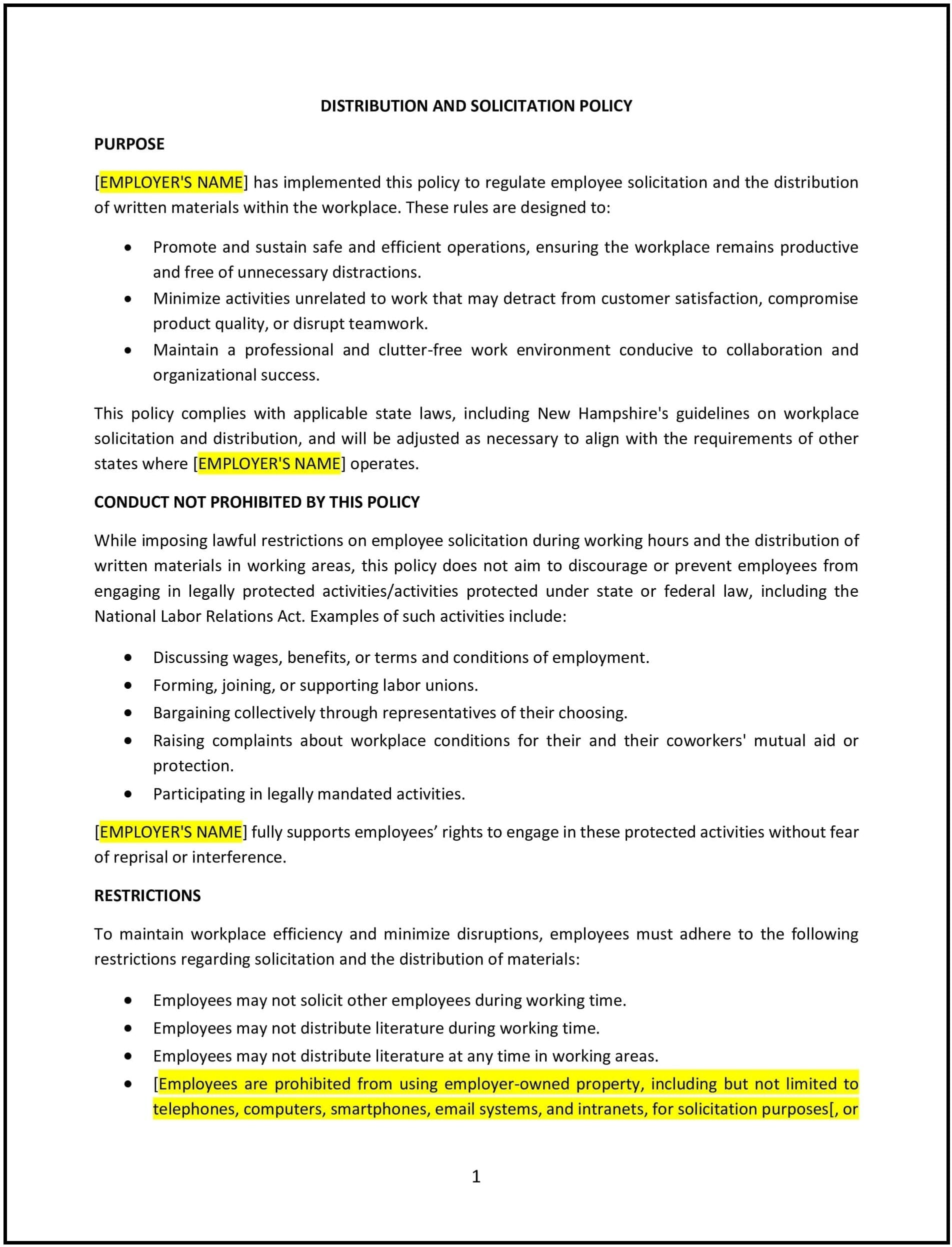Distribution and solicitation policy (New Hampshire): Free template
Got contracts to review? While you're here for policies, let Cobrief make contract review effortless—start your free review now.

Customize this template for free
Distribution and solicitation policy (New Hampshire)
A distribution and solicitation policy helps New Hampshire businesses manage external and internal requests for distributing materials or soliciting support. This policy outlines the guidelines and procedures for managing sales, donations, or marketing activities, and ensures that solicitation and distribution activities do not disrupt business operations or violate the company’s values.
By adopting this policy, businesses in New Hampshire can maintain a professional environment, avoid unwanted solicitations, and safeguard the interests of both the business and its employees.
How to use this distribution and solicitation policy (New Hampshire)
- Define acceptable solicitation: Specify what types of solicitation and distribution activities are allowed, such as charity drives, sales campaigns, or marketing events.
- Set boundaries for solicitation activities: Clarify where and when solicitations can take place, whether on company property or during work hours, and under what conditions. For example, solicitation might be allowed only during certain times or in designated areas.
- Establish approval procedures: Outline the process for seeking approval before engaging in any solicitation or distribution activities, whether internal or external, and specify who within the company is responsible for granting approval.
- Protect employees from disruption: Ensure that solicitation activities do not interfere with employees’ work or create a disruptive environment, particularly in the workplace or during business hours.
- Address third-party solicitation: Define the rules for third-party organizations or individuals soliciting donations, sales, or other services on company premises, including whether outside solicitors are permitted.
- Specify exceptions: List any exceptions to the policy, such as if there is an approved company charity event or specific employee group seeking to distribute materials.
- Monitor compliance: Outline how the policy will be monitored and enforced, including the process for addressing violations and the consequences of failing to adhere to the policy.
- Review and update: Regularly review the policy to reflect New Hampshire regulations, business needs, and best practices for solicitation and distribution activities.
Benefits of using this distribution and solicitation policy (New Hampshire)
This policy provides several benefits for New Hampshire businesses:
- Minimizes disruptions: By setting clear rules for solicitation and distribution, businesses can reduce interruptions to employees’ work and ensure that activities do not interfere with daily operations.
- Promotes fairness: Establishing guidelines for solicitation activities ensures that all employees are treated equally, with clear and consistent rules about who can solicit and under what conditions.
- Protects company reputation: By controlling the type of solicitations that occur on company premises, businesses can avoid associating with unwanted or inappropriate organizations, helping to preserve their reputation.
- Increases transparency: A clear and structured policy promotes transparency in how solicitations and distributions are handled, making it easier for employees to understand what is allowed and why.
- Ensures compliance with legal standards: Helps businesses comply with local New Hampshire regulations and avoid potential legal issues related to unwanted solicitation activities.
Tips for using this distribution and solicitation policy (New Hampshire)
- Communicate the policy clearly: Ensure that all employees understand the policy, including which solicitation activities are allowed, where they can take place, and how to seek approval.
- Monitor activities: Keep track of any solicitation or distribution activities within the company to ensure they comply with the policy and do not disrupt business operations.
- Enforce the policy: Take appropriate action if the policy is violated, ensuring consistent enforcement and a professional workplace environment.
- Offer alternative options: If solicitation is restricted, consider offering employees alternative ways to participate in charity drives or events, such as through email or designated donation boxes.
- Review the policy regularly: Update the policy as needed to reflect changes in New Hampshire laws, business operations, or employee preferences.